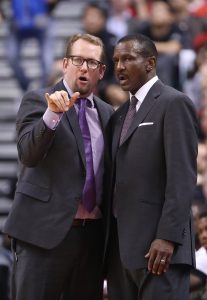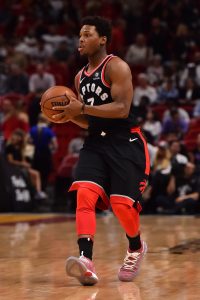The most successful Raptors team ever finished 2017/18 with 59 wins and claimed the No. 1 seed in the East for the first time in club history. With a revamped offensive approach and a dynamic bench, the Raptors appeared poised to make a deep playoff run, but for a third straight year, LeBron James and the Cavaliers made quick of Dwane Casey‘s club in the postseason.
While no one in the Eastern Conference has defeated a LeBron-led team in the playoffs since 2010, Toronto’s four straight losses reflected particularly poorly on the club, considering the Pacers and Celtics both pushed the Cavs to seven games. As a result, Casey was dismissed and the Raps enter a second straight offseason weighing whether or not to make significant changes to a roster that won 50+ games.
Here are five key questions facing the franchise this summer:
 1. Was firing Casey and replacing him with Nick Nurse the right move?
1. Was firing Casey and replacing him with Nick Nurse the right move?
Casey, who was named the 2017/18 Coach of the Year by the National Basketball Coaches Association last month, is also a finalist for the NBA’s official Coach of the Year award. When the league announces the winner of that award next week, it’s entirely possible that Casey, now the Pistons’ head coach, will be formally recognized for his excellent work with the Raptors.
Why would a coach who had so much on-court success and who was so highly regarded in Toronto be fired, especially since the club eventually replaced him one of his top assistants? If the Raptors really felt they had to move on from Casey, wouldn’t it make sense to go in an entirely new direction? Wouldn’t Nurse, an assistant on Casey’s staff since 2013, already have shared many of his best ideas?
Those are fair questions, but I still believe there’s some sound logic behind the change. As good as he was at building a culture and developing players, Casey struggled with in-game adjustments, which hurt the Raptors at key moments in the postseason. Additionally, there were whispers in Toronto that Casey, a fairly conservative, defensive-minded coach, was more inclined to lean on his defense-first assistants like Rex Kalamian rather than Nurse, who received much of the credit for the Raps’ new-look offense.
While Nurse may not have been the Raptors’ first choice – the team reportedly coveted Mike Budenholzer before he was hired by the Bucks – he’s a creative thinker who will be willing to take some risks and experiment with new approaches. That could be just with the team needs.
2. Will the Raptors break up their All-Star backcourt?
Best friends Kyle Lowry and DeMar DeRozan have excelled in the regular season for years, but remain inconsistent in the Raptors’ biggest postseason games, raising questions about whether the team can ever seriously vie for a title with Lowry and DeRozan as its best players.
Even if the Raptors decide to trade one of its two star guards, it’s unclear if either player would return the sort of value the team would want. Lowry’s abilities as a play-maker, shooter, and defender are underrated to some extent, but he’s also 32 years old and is owed $64MM+ over the next two years.
As for DeRozan, he has established himself as one of the game’s most effective scorers, expanding his shooting range in 2017/18, but he’s still not a consistent three-point threat, and he’s a below-average defender. Like Lowry, he’s pricey too, with three years and $83MM left on his contract.
Lowry and DeRozan have positive trade value, but moving contracts of that magnitude is complicated — when the Pistons traded Blake Griffin and his $29MM+ salary earlier this year, the deal involved six players, plus draft picks. Putting together a blockbuster trade with Lowry or DeRozan at the center that would appeal to both the Raptors and another team would be tough. Making it a deal that allows Toronto to rework its roster without taking a step backward would be even tougher.
3. Who are the Raptors’ other trade candidates?
The Raptors have made it clear that they’d be willing to discuss any player on their roster and are even said to be exploring the market for a lottery pick, so no one is untouchable. Having said that, there are a handful of players that Toronto will be reluctant to move. OG Anunoby and Pascal Siakam, for instance, look like long-term building blocks at the three and four, respectively. The Raptors would certainly prefer to trade the higher-priced veterans at those positions, like Serge Ibaka ($21.67MM) and C.J. Miles ($8.33MM), allowing the youngsters to take on larger roles.
The same could be said at center, where Jakob Poeltl often earned key minutes over Jonas Valanciunas ($16.54MM). However, Nurse is fond of Valanciunas and may like to see the club keep him around.
Toronto’s most obvious trade candidate is Norman Powell, who signed a four-year extension with the club last fall. At the time, locking up the young swingman – who had provided a spark in the playoffs and showed three-and-D potential – seemed like the savvy move. After a disappointing 2017/18 campaign, that four-year, $42MM investment looks like a misstep.
Still, Powell is young enough to bounce back, and there should be teams around the NBA willing to buy low on a high-energy wing who shot 35.1% on three-pointers prior to last season. Powell has a $1.47MM cap hit until June 30, so a team that wants to roll the dice on him could move quickly to avoid having to match his $9MM+ salary for 2018/19.
4. Will Fred VanVleet remain with the Raptors?
An undrafted rookie two years ago, VanVleet enjoyed a breakout season in 2017/18. He was the unofficial captain of the Raptors’ vaunted second unit, thriving against opposing teams’ benches and earning regular minutes in the club’s crunch-time lineups alongside Lowry and DeRozan.
VanVleet will be a restricted free agent this summer and GM Bobby Webster has said the team’s “highest priority” this offseason will be re-signing the young point guard. Negotiating with VanVleet directly would be preferable to waiting on an offer sheet, since the Arenas provision would allow a rival team to include a massive third-year raise in its offer, like the Nets did with Tyler Johnson in 2016 — Johnson’s cap hit will rise from $5.88MM to $19.25MM this summer as a result of that deal.
With Early Bird rights on VanVleet, the Raptors could offer a four-year deal worth up to about $9MM annually. That may seem like an overpay for someone whose NBA résumé is so limited, but it’s less than a third of what Lowry will earn per year, and VanVleet’s abilities as a defender and three-pointer shooter aren’t as far behind Lowry’s as you’d think.
5. Is Raptors ownership ready to pay the tax?
With Powell’s new extension about to kick in, the Raptors have a 2018/19 team salary of $126MM+ for just 11 players. That figure projects to cross the luxury tax line and doesn’t include a new deal for VanVleet.
Team ownership would likely be willing to foot a luxury tax bill for a title contender, but after a second consecutive second-round playoff exit, Toronto can’t afford to just run things back with the same group. Still, after giving up their 2018 first-round pick to dump DeMarre Carroll‘s contract last summer, the Raps also don’t want to make a habit of attaching good assets to bad contracts just to cut costs.
It’s a tough call for the franchise and one that ownership will be involved in. If the Raptors re-sign VanVleet, it would be hard to avoid becoming a taxpayer, but I’d expect the team to be a little more aggressive in that scenario in its attempts to move a contract or two. It’s also worth noting that Toronto could enter the season above the tax line and still make an effort to avoid the tax later in the year by making a mid-season trade or two.
Here’s where things currently stand for the Raptors financially:
Guaranteed Salary
- Kyle Lowry ($31,000,000)
- DeMar DeRozan ($27,739,975)
- Serge Ibaka ($21,666,667)
- Jonas Valanciunas ($16,539,326)
- Norman Powell ($9,367,200)
- C.J. Miles ($8,333,333)
- Jakob Poeltl ($2,947,320)
- Delon Wright ($2,536,898)
- OG Anunoby ($1,952,760)
- Malachi Richardson ($1,569,360)
- Pascal Siakam ($1,544,951)
- Justin Hamilton ($1,000,000) — Waived via stretch provision
- Total: $126,197,790
Player Options
- None
Team Options
- None
Non-Guaranteed Salary
- Alfonzo McKinnie ($1,378,242)1
- Total: $1,378,242
Restricted Free Agents
- Lucas Nogueira ($4,140,964 qualifying offer / $8,841,915 cap hold): Bird rights
- Nando De Colo ($1,828,750 qualifying offer / $1,901,900 cap hold): Early Bird rights
- Fred VanVleet ($1,699,698 qualifying offer / $1,699,698 cap hold): Early Bird rights
- Total: $12,443,513
Unrestricted Free Agents / Other Cap Holds
- Lorenzo Brown ($1,499,698): Non-Bird rights
- Jason Thompson ($1,499,698): Non-Bird rights
- Total: $2,999,396
Projected Salary Cap: $101,000,000
Projected Cap Room: None
- The Raptors have more than $126MM in guaranteed salaries on their books before even accounting for a raise for VanVleet. They won’t have cap space available.
Footnotes:
- McKinnie’s salary becomes fully guaranteed after July 20.
Note: Rookie scale cap holds are estimates based on salary cap projections and could increase or decrease depending on where the cap lands.
Salary information from Basketball Insiders was used in the creation of this post. Photos courtesy of USA Today Sports Images.
Just keep the team as is and give OG Anunoby a full-time role at small-forward. OG and Jonas developing are the keys to the Raptors bringing a title to Toronto next season. I trust OG can become a special player next season and possibly an ALL-NBA defense selection. I expect Nurse to have great influence on Jonas and bring out his best next season.
I actually agree with you. I expect big things from OG and JV this season. I think both have a lot more to offer. Ibaka needs to go- he is overpaid and soft
Everyone is sleeping on OG because he tore his ACL in college which is why he dropped in the draft. An off-season of physical development will have OG ready to go next season so he can be that 2 way machine on both ends for the Raptors.
You got to give this to more years with the same team and the new coach. The way they’re built you got a ride this out so some of those contracts are gone. It’s a winning team so just roll with it. Can’t do much else and with LeBron going to the Lakers, that could open up things.
Lowry has to go he is a non factor in big games same with Ibaka.
VanVleet is quite underwhelming to me, so if he is not much behind Lowry, that doesn’t say much good about Lowry, I do agree I think Lowry should go if, & that is a big IF they can find someone who would want him at 32MM/year aged 32… SMH